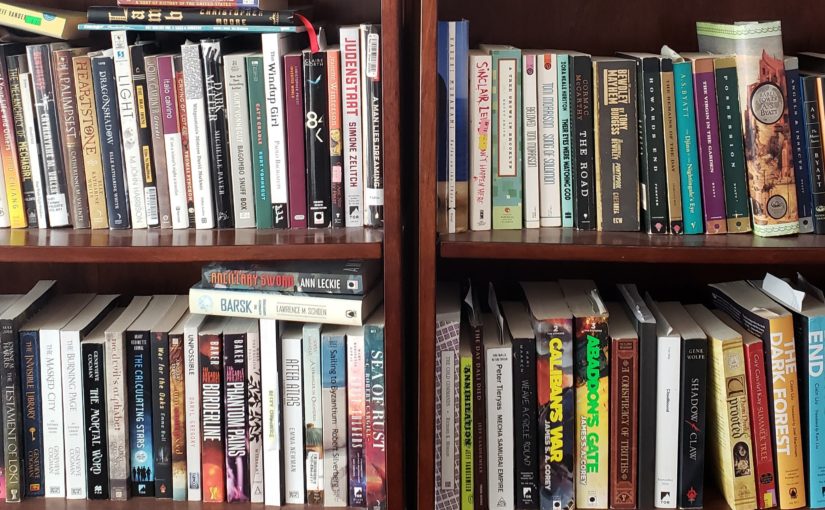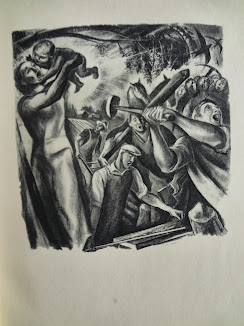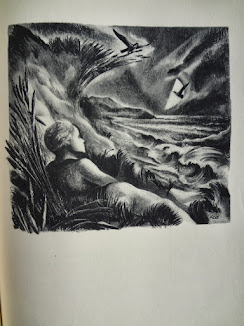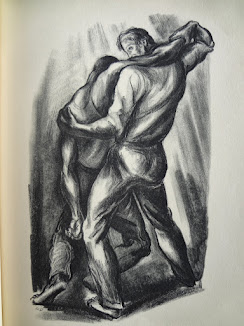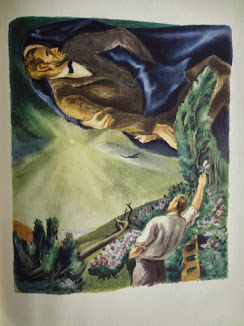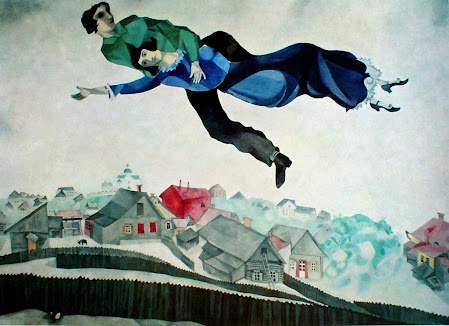I rounded up the books I’d read for the year a couple years back, which I hoped to make into something of a tradition. Alas, I’ve never done well when I assign myself homework, so last year went by without a roundup. But I guess I’m back! We’ll see how this goes. I’m still pretty focused on lighter fare, like I was at the start of the pandemic, but I’ve managed to slip in some horror here and there, mostly stuff I’d read already. In fact, I did a lot of rereading this year; I’m just not interested in surprises. So, without further ado:
Stuff I read for class:
The Collected Works of T.S. Eliot. If you weren’t aware, I finally finished up the English degree I started eleventy million years ago. The class itself was a senior seminar style class — where your grade is based on a single, bigass paper — and the class was called “T. S. Eliot and War.” We started with the WWI poets — Siegfried Sassoon, Wilfred Owen, Rupert Brooke, &c — and then worked our way into Prufrock, The Wasteland, and the Four Quartets. It’s been a hot minute since I seriously read poetry, so it was very rewarding to get hip deep in the one of the most important poets of the 20th Century. I’m not sure who this is attributed to, but one pithy take on Eliot goes: Modernism begins between the second and third lines of “The Love Song of J. Alfred Prufrock.”
The Midwich Cuckoos by John Wyndham. A small town gets knocked out by an unidentified force, after which it turns out all the women of childrearing age are knocked up. A comedy of manners that ends on a bang.
Day of the Triffids by John Wyndham. This novel defies the wisdom that you shouldn’t have too much weird stuff going on in a novel, because first up, almost everyone on earth is blinded by a celestial event, and then, while society is breaking down and everything is a mess, giant, ambulatory, carnivorous plants start preying on the survivors. Fun fact: Alex Garland lifted the opening of Triffids, which follows a patient who was convalescing in hospital & who doesn’t know about the recent cataclysm, for 28 Days Later.
The War of the Worlds by H. G. Wells. O.G. alien invasion narrative, which reads really weird now. Published in 1897, it pre-dates both world wars, and it shows. My paper ended up being on what Wyndham took from Wells when he wrote his own alien invasion narrative, fifty years and two world wars later.
Hidden Wyndham by Amy Binns. As far as I know, the only biography of Wyndham available, published in the last few years. I feel like Wyndham is experiencing a little bitty renaissance, because he is so much more interesting than many of his peers. Hidden Wyndham publishes just scads of his letters to the love of his life while they were separated by the war, and I admit I cried.
The History of Science Fiction by Adam Roberts. I also read a lot of academical stuff for the paper, but I’m not going to bore you with psychoanalytic takes on mid-century scifi or whatnot. I mention The History of Science Fiction because I read around for sections which dealt with my specific topics, and hit a three page analysis of The Midwich Cuckoos which was better than every other bit of criticism I’d read about that novel by a country mile. I made a mental note to get back to his fiction when I remember; Roberts is also a science fiction writer himself. I recommend following his twitter if you’re into extremely erudite dad jokes and multi-lingual puns.
Zombies!
Most of my zombie reads were rereads, so we’ll start with the new stuff.
Love, Lust, and Zombies: Short Stories edited by Mitzi Szereto. Short story collection about people banging the undead. Look, I know. Would you believe I read it for the articles? I do think it’s notable, given the burgeoning subgenre of monsterotica, that zombies almost never are portrayed as fuckable, a paradox of the zombie’s curious detachment and their voraciousness. Something something, quip about the little death and the big one.
The Down Home Zombie Blues by Linnea Sinclair. Turns out, not actually about zombies, which I found incredibly disappointing. Buddy-cop alien-invasion narrative with hive-mind space chthulu, set in Florida. Make of that what you will.
Everything Dies by T. W. Malpass. I read the first “season”; this is apparently some kind of serial. Decent, but it’s got the wordiness of serials and the tendency to jump around in a way that works when you’re consuming something episodically, but not so much in a binge. I’m on the fence about whether to continue.
The First Thirty Days by Lora Powell. Self-pub with the requisite typos and infelicities, but stronger than most. Kinda not into the fact that a vaccine is responsible for the zombie apocalypse. Given the pub date, this isn’t Covid vaccine denialism, just the regular kind, but it still rankles. I liked the slow collection of survivors; I didn’t like the cartoony bad guys in the third act. I also enjoyed that these zombies were fast zombies initially, but as they decomposed, they got more like the shamblers of yore. Not that physics exists in zombie stories, but I liked that these zombies decomposed like bodies would.
This is Not a Test by Courtney Summers. YA novel about a young woman who is suicidal when the zombie apocalypse hits, and ends up riding it out in the high school with a collection of frenemies. There’s a real thing that depressed people tend to do better in crisis situations, because they’ve been catastrophizing the whole time so sure, why not zombies. Beautifully written and worth the reread.
Severance by Ling Ma. Legit, I reread this almost exclusively because I watched the AppleTV series, Severance (no relation). This novel definitely cemented my opinion that zombie novels more accurately capture the experience of living through a pandemic than fiction about pandemics. This lappingly memoirish novel follows a post-college millennial through a global outbreak of Shen fever, which strips its victims down to one rote action until they die of exposure or malnutrition. She keeps working her publishing job as New York empties, masked and Zooming with a smaller and smaller group of people.
Zone One by Colson Whitehead. This is maybe the third time I’ve read this, second time I’ve listened to the audio, which is very good. Once you get past the 50c words and the complex syntax — not to mention how aggressively deadpan the narrative voice is — Zone One is seriously freaking funny. It’s honestly become one of my favorite novels. Zone One is also elegiac about a lost New York, like Severance, and is probably best understood as a 9/11 novel, of sorts.
The Dark Earth by John Hornor Jacobs. Another super rewarding reread. Jacobs isn’t reinventing the zombie wheel here — they’re pretty standard shamblers — but this book really cemented a lot of my early ponderings about the American instinct towards fascism, what zombie stories tend to say about domesticity, etc. The way the story is told through interlocking perspectives is absolutely aces, and there’s a sequence with a steam train which rules.
Seanan McGuire
The InCryptid Series. McGuire is seriously seriously prolific, so if you’re looking for three dozen novels or so because you’ve got a long weekend, look no further. I read the first four InCryptid books — Discount Armageddon, Midnight Blue-Light Special, Half-Off Ragnarok, and Pocket Apocalypse (I was today years old when I got the pun the title; the novel takes place in Australia), but I bounced off the fifth, Chaos Choreography. This is notable, because it usually takes me two books to run out steam with a series and have to take a break. InCryptid features a sprawling family of cryptozoologists (some of whom happen to be cryptids themselves). The first was published in 2012, and it isn’t so different from the glut of urban fantasy published in the 2010s, but they get weirder and more McGuire-like as they go on, which is cool to watch happen.
Wayward Children. I continued my read of Wayward Children with Down Among the Sticks and Bones, Beneath the Sugar Sky, and In an Absent Dream. I can’t recommend this series enough. It’s a sort of meta-portal fantasy, and the plots have the logic of dreams and nightmares. In an Absent Dream is absolutely gutting so I had to take a break, but I’ll be back.
Mira Grant. I also read a couple of her novels published under the Mira Grant name, which I think largely she uses for her more science horror stuff, but who even knows. Alien Echo is a YA novel set in the Alien universe. Olivia and Viola are the twin daughters of xenobiologists whose colony gets overrun with xenomorphs. Totally decent tie-in novel. Kingdom of Needle and Bone has a similar vibe to the Newsflesh books, which I enjoyed greatly despite my often loud bitching. Unfortunately, the book is about a pandemic, and I am not capable of reading about pandemics right now. I suspect this was supposed to be the start of a series, but Covid put an end to that, along with so much else. Oh, and speaking of that, I am absolutely dying for another killer mermaids book, like Into the Drowning Deep, but I think there might be some fuckery with the publisher? I really hope they get that nonsense worked out.
Ann Aguirre
Galactic Love. I’ve found my way working through Aguirre’s back catalogue because she’s a rock solid journeyman writer who is often quietly subversive as hell, especially when it comes to toxic genre tropes. Like in the first of her Galactic Love series, Strange Love, Aguirre takes on alien abduction romance, a sub-genre which is often a trash fire of dub-con and dudes with weird dicks. Strange Love is instead a charming, funny story with a talking dog and a Eurovision-ish contest, and the alien doesn’t even have a dick. This year I read the third, Renegade Love, which isn’t as great as Strange Love, but is still pretty great. It’s about a froggy dude in a murder suit, what more could you possibly need to know?
Mirror, Mirror. Mirror, Mirror is the second in her Gothic Fairytales series, after Bitterburn. I really enjoyed the Beauty & the Best retelling in Bitterburn, even if the end fizzled a bit, but I feel like Mirror, Mirror, which takes on Sleeping Beauty (sort of), was a misfire. The novel’s protagonist is the step-mother, and while I appreciated the attempt at inverting the tropes — it’s the mother that’s evil, not the step-mother — I don’t think the novel really gets under the hood of what those tropes say about motherhood, etc. The novel instead just relabels the good mom and the bad one.
Grimspace. The first in the Sirantha Jax novels about an FTL pilot who gets pinned as the patsy in some galactic political fuckery. Peripatetic space opera which moves pretty fast. The main character sometimes annoyed me with the gormlessly naïve thing that is common to this kind of protagonist, but still a totally decent novel.
Witch Please. Bounced off this hard, but then I have close to zero patience for contemporary romance, which this is. Just including it because Aguirre writes in a lot of different genres, which I think is nifty, even if they’re not to my taste.
Jessie Mihalik
I discovered Mihalik some time in October, and I’ve been tearing through her books. Incredibly fast-moving space operas, often with labyrinthine galactic court drama and some light kissing. The Consortium Rebellion series — Polaris Rising, Aurora Blazing and Chaos Reigning — just keep getting better, partially because I think she stops relying on tropes and types so hard. (Like one of the characters in Polaris Rising is 100% Riddick with the serial numbers filed off). Too be clear: tropes and types are what makes a genre, so I’m not slagging this, just observing. The first two of the Starlight’s Shadow series, Hunt the Stars and Eclipse the Moon, have a Vulcan-y psychic race which I am totally into, but I think the books are occasionally hamstrung by their first person narrators, especially the first. I’m reading The Queen’s Advantage, the second of the Rogue Queen series right now. The first, The Queen’s Gambit, has an Amadala-type elected queen, which is silly, but then mostly she’s queen so the title works, which is whatever. They’re all superfun books, and if you’re looking to while away an attack of insomnia, don’t pick these up because you will never go back to sleep. Just one more chapter.
Various Series I Continued Reading
Kiss of the Spindle by Nancy Campbell Allen. Steampunky take on Sleeping Beauty, and the second in a series begun with Beauty and the Clockwork Beast. The previous novel had a really cool protagonist, but the mystery plot was almost offensively stupid. Kiss of the Spindle improves on this by having a cool protagonist, and then also the whole locked room mystery was fun to watch play out. The antagonist ended up being the most compelling character by far, and I was bummed to see the next novel in the series wasn’t about him.
Raven Unveiled by Grace Draven. The last (?) of the Fallen Empire series didn’t quite work for me. We’ve met both main characters before — Gharek of Cabast and Siora — and the novel is supposed to be a redemption arc for the former. Alas, I felt like he was too much of a jerk to be redeemed, so I was ambivalent about the novel. I will always love Draven’s prose style, but I just can’t love Gharek. (I also reread all of the Wraith Kings series, of course.)
Irin Chronicles by Elizabeth Hunter. I read the first three of the Irin Chronicles series ages ago, when PNR was in its angel phase. I loved how Hunter dealt with the concept of a mate bond. Hunter addresses a specific fucked up situation which would inevitably happen if indeed the mate bond existed in book 2 or 3 of the Irin books — can’t remember exactly. I’ve only seen one other writer address this situation (but not this well). I never continued on with the series because of my aforementioned need for series breaks, but I finally got around to reading books 6, 7 & 8, The Silent, The Storm, and The Seeker. (I skipped #4, The Staff and the Blade, because I find Damien and Sari kind of annoying.) They were all enjoyable in their own ways, but The Seeker rises to a crescendo which could serve as a series ender, if she decides not to go on.
Ruby Fever by Ilona Andrews. Perfectly cromulent conclusion to Catalina’s arc in the Hidden Legacy series. The husband and wife team behind the pen name have this tendency to rely on eugenics in their magic systems, which can flower into full-on magical fascism. (The Kate Daniels books especially are guilty of this, most egregiously in Blood Heir, which I also read this year. I did not like Blood Heir.) Fortunately, in Ruby Fever they seem to be aware of how screwed up a system based on heritable magic would be, and there’s some direct critique in the novel. Ruby Fever also showcases their trademark ability to begin a novel with three totally screwed up but seemingly unrelated situations, and then have them escalate and entwine into a massive disaster. Even if I’m not into a book of theirs, they are very, very good at what they do. (Oh also, apparently I read Fated Blades, their most recent novella in the Kinsmen Universe, a series which they started and abandoned over a decade ago. I didn’t love it, but it was fine.)
Fugitive Telemetry by Martha Wells. The sixth Murderbot Diaries book, Fugitive Telemetry takes place before book 5, so the timeline was a little confusing at points. I thought we were going to get a road trip with ART after the last? Anyway, fun little locked room (locked space station?) mystery, full of Murderbot’s trademark kvetching. For a series based on a bot what murders, the Murderbot Diaries are surprisingly cozy reads. Murderbot just wants to get back to its stories when other peoples’ horseshit gets in the way. Big same, Murderbot.
Last Guard by Nalini Singh. I reread a few Psy-Changeling novels this year, to better and worse results. I invariably enjoy the books which focus on two Psy as the romantic leads, because all the growling and posturing of the changelings gets real old fast. The Psy are dealing with massive trauma, on a society-wide level, and Singh never defaults to the love of a good woman (or shape-shifter, whatever) to heal the damage. Her characters are going to have to work for it. Anyway, Last Gaurd has for its protagonists two Psy with disabilities — one physical and one mental. This is notable, because the Psy have practiced an incredibly nasty form of eugenics for last 100 years. We also get a closer look at the first gay couple I’ve ever seen in the Psy-Changeling novels. I think this is probably the best of the Psy-Changeling Trinity books to date.
Dukes are Forever and From London with Love by Bec McMaster. Dukes are Forever is the conclusion to McMaster’s London Steampunk series, and it absolutely sticks the landing. The series takes place in an alt-Victorian England where the upper classes have turned into literal blood-sucking parasites due to a communicable disease which is basically vampirism. It’s not a particularly careful alt-history — if you want that from your steampunk, read Meljean Brook’s Iron Seas series instead — but it is incredibly pulpy and energetic. From London with Love is an epilogue novella, which isn’t required reading or anything, but it was a nice denouement to a series I followed for whatever dozen books.
Various One-Offs
A Lush and Seething Hell by John Hornor Jacobs. Two novellas in a cosmic horror vein. While I liked The Sea Dreams It Is the Sky, a post-traumatic wig-out set in a South American country’s slide into dictatorship and its horrific aftermath, it didn’t quite get me like My Heart Struck Sorrow, about some librarians collecting the textured horror, sorrow, and folklore of the American south. There’s an alt-history where I became a folklorist, and I deeply appreciate the porousness of the collector and the collected. Also, while there’s some eldritch stuff going on in the center of both novels, the real horror is other godamn people.
Half a Soul and Ten Thousand Stitches by Olivia Atwater. Gaslamp fantasies set in the Regency period, and really very good. Atwater has a delightful way of shifting the perspective just enough so that somewhat tired tropes become interesting again. The main character in Half a Soul reads to me as non-neurotypical, and the protagonist in Ten Thousand Stitches is a servant, of all things. Both act as pretty furious indictments of the class system — far beyond the more anodyne “it sucks to be a penniless relation” kind one can find in this sort of thing.
Legends & Lattes by Travis Baldree. Baldree pinned the coziness slider all the way up on Legends & Lattes, a fantasy novel about an orc mercenary putting up her sword and opening a coffeeshop. If you’re looking for a comfort read with a focus on simple, sensual pleasures, this is the book for you. Also, there’s a huge, adorable dire cat.
Titus Groan by Melvyn Peake. Technically finished this in ’21, but I never did a round up last year, so. Tolkien’s Lord of the Rings is almost always invoked alongside the Gormenghast trilogy, and I can see why that is to a degree: they are both essentially English in a way I can identify but not define, and both describe a world on the knife’s edge. Both Gormenghast and Middle Earth are close to, if not wholly, a fantasy of manners, describing worlds circumscribed by the weight and the import of tradition and legend. Both end with this tightening sense of change introduced into a system which has been essentially (purportedly, nominally) changeless. Peake uses the language of apostasy to describe this coming cataclysm: the concepts of both heresy and blasphemy permeate those last chapters which detail the young Titus’s earling: the world of Gormenghast is as rule-bound as any horror novel, and often more obscene. It’s completely legible to me that someone born at the burnt end of the Edwardian era and who lived through the second world war would produce something as strange as Gormenghast — born as the old world falls away and the new one burns. All hail Titus, the 77th Earl of Gormenghast. God save us all.
Midnight Bargain by C. L. Polk. Probably the best read-alike to Midnight Bargain would be Shades of Milk and Honey by Mary Robinette Kowal: the setting is Regency-ish, but the situation is complicated by a tiny bit of magic. Beatrice Clayborn comes to Bargaining Season with her family mortgaged to the hilt to fund whatever alliance can be made through her marriage. She’s also practicing magic in secret, a magic which will be severed and suppressed by a marital collar. The metaphors at play could absolutely be too on the nose, but Polk has a Regency-level restraint and never overplays the obvious gendered (and class) dynamics.
We by Yevgeny Zamyatin. I could probably put this in the “books I read for class” category, because I peer reviewed a paper about this, Brave New World and 1984. I’d already read the other two, so I thought, what the hell. And I’m glad I did, because this book ended up being an absolute banger. Written in the Soviet Union in 1920-ish, We is THE classic dystopia; both Huxley and Orwell cribbed from Zamyatin. D-503 is an engineer in a city made of glass and organized by scare quote “rational principles” un-scare-quote. The novel itself is an epistolary, of sorts: the One State is building a generation ship to colonize and proselytize aliens, when they find them; he is writing to the as yet undiscovered aliens. He kinda reminded me of the narrator in “The Horla,” a short story by Guy de Maupassant, the way he gets more and more unhinged as the narrative progressive, the difference being that We is a satirical comedy and “The Horla” is not.
So that’s it! I probably read some other stuff I can’t remember, but this is definitely the high notes. Another year, another teetering TBR.
